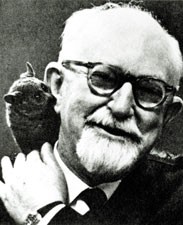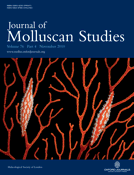
Malacology is the branch of invertebrate zoology that deals with the study of the Mollusca, the second-largest phylum of animals in terms of described species after the arthropods. Mollusks include snails and slugs, clams, and cephalopods, along with numerous other kinds, many of which have shells. One division of malacology, conchology, is devoted to the study of mollusk shells. Malacology derives from Ancient Greek μαλακός (malakós) 'soft', and -λογία (-logía).

George Gaylord Simpson was an American paleontologist. Simpson was perhaps the most influential paleontologist of the twentieth century, and a major participant in the modern synthesis, contributing Tempo and Mode in Evolution (1944), The Meaning of Evolution (1949) and The Major Features of Evolution (1953). He was an expert on extinct mammals and their intercontinental migrations. Simpson was extraordinarily knowledgeable about Mesozoic fossil mammals and fossil mammals of North and South America. He anticipated such concepts as punctuated equilibrium and dispelled the myth that the evolution of the horse was a linear process culminating in the modern Equus caballus. He coined the word hypodigm in 1940, and published extensively on the taxonomy of fossil and extant mammals. Simpson was influentially, and incorrectly, opposed to Alfred Wegener's theory of continental drift, but accepted the theory of plate tectonics when the evidence became conclusive.

Acarology is the study of mites and ticks, the animals in the order Acarina. It is a subfield of arachnology, a subdiscipline of the field of zoology. A zoologist specializing in acarology is called an acarologist. Acarologists may also be parasitologists because many members of Acarina are parasitic. Many acarologists are studying around the world both professionally and as amateurs. The discipline is a developing science and long-awaited research has been provided for it in more recent history.

Sir Charles Norton Edgcumbe Eliot was a British diplomat, colonial administrator and botanist. He served as Commissioner of British East Africa in 1900–1904. He was British Ambassador to Japan in 1919–1925.

The Zoological Journal of the Linnean Society is a monthly peer-reviewed scientific journal covering zoology published by Oxford University Press on behalf of the Linnean Society. The editor-in-chief is Maarten Christenhusz. It was established in 1856 as the Journal of the Proceedings of the Linnean Society of London. Zoology and renamed Journal of the Linnean Society of London, Zoology in 1866. It obtained its current title in 1969.

The Journal of Zoology is a scientific journal concerning zoology, the study of animals. It was founded in 1830 by the Zoological Society of London and is published by Wiley-Blackwell. It carries original research papers, which are targeted towards general readers. Some of the articles are available via open access, depending on the author's wishes. According to the Journal Citation Reports, the journal has a 2020 impact factor of 2.322, ranking it 36th out of 175 journals in the category "Zoology".

The Bulgarian Academy of Sciences is the National Academy of Bulgaria, established in 1869.
A zoological society is a group or organization, often a voluntary association, interested in fields of study related to the animal kingdom. These fields generally include zoology, animal physiology, pathology, veterinary medicine, wildlife conservation, conservation biology, and related topics. Zoological societies are often associated with the operation and/or management of zoos, public aquariums, veterinary hospitals, research institutions, and conservation projects, and with the publication of scientific journals and periodicals. The first such society was the Zoological Society of London, founded in 1826.

Ichthyology & Herpetology is a quarterly peer-reviewed scientific journal covering research in ichthyology and herpetology that was originally named after Edward Drinker Cope, a prominent American researcher in these fields. It is the official journal of the American Society of Ichthyologists and Herpetologists. According to the Journal Citation Reports, Copeia has a 2021 impact factor of 1.857, ranking it 65th out of 176 journals in the category "Zoology".
Primates is a bimonthly peer-reviewed scientific journal of primatology, and an official journal of the Japan Monkey Center at Kyoto University. It publishes original papers that cover all aspects of the study of primates. The journal publishes original research articles, reviews, news and perspectives, and book reviews. It was established in 1957 by Kinji Imanishi. Although the first volume contained both articles in Japanese or English, subsequent volumes were published in English, thanks to a grant from the Rockefeller Foundation. It is now published by Springer and the current editor-in-chief is Masayuki Nakamichi.
Island Arc is a peer-reviewed quarterly scientific journal that was established in 1992, covering "Earth Sciences of Convergent Plate Margins and Related Topics". It is published by Wiley-Blackwell on behalf of the Geological Society of Japan, in association with the Japan Association for Quaternary Research, Japan Association of Mineralogical Sciences, Palaeontological Society of Japan and the Society of Resource Geology.

The American Journal of Primatology is a monthly peer-reviewed scientific journal and the official journal of the American Society of Primatologists. It was established in 1981 and covers all areas of primatology, including the behavioral ecology, conservation biology, evolutionary biology, life history, demography, paleontology, physiology, endocrinology, genetics, molecular genetics, and psychobiology of non-human primates. Besides its regular issues, the journal publishes a yearly supplementary issue detailing the program of the society's annual meetings. The editor-in-chief is Karen Bales. The types of papers published are: original research papers, review articles, book reviews, commentaries, and plenary addresses.

Animal Biology is a peer-reviewed scientific journal in the field of zoology. It is the official journal of the Koninklijke Nederlandse Dierkundige Vereniging and published on behalf of the society by Brill Publishers. The journal was established in 1872 as the Archives Néerlandaises de Zoologie and renamed Netherlands Journal of Zoology in 1967. It has been known under its current name since 2004.
Frontiers in Zoology is a peer-reviewed open access scientific journal covering all aspects of zoology. It was established in 2004 and is published by BioMed Central on behalf of the German Zoological Society. The editors-in-chief are Jürgen Heinze and Ulrich Technau.

The Journal of Molluscan Studies is the peer-reviewed scientific journal of the Malacological Society of London, covering research in malacology.
Mycoscience is a peer-reviewed scientific journal covering all aspects of basic and applied research on fungi, including lichens, yeasts, oomycetes, and slime moulds. It is the official journal of the Mycological Society of Japan. A publication of the Mycological Society of Japan, it was founded in 1956 as Transactions of the Mycological Society of Japan (1956–1993) and was later titled Mycoscience (1994–present).
The Canadian Journal of Zoology is a peer-reviewed scientific journal that covers zoology. It was established in 1951 as the continuation of Canadian Journal of Research, Section D: Zoological Sciences, and is associated with the Canadian Society of Zoologists.

Behavioral Ecology is a bimonthly peer-reviewed scientific journal published by Oxford University Press on behalf of the International Society for Behavioral Ecology. The journal was established in 1990.
Palaeontologia Electronica is a triannual peer-reviewed open-access scientific journal published by Coquina Press covering paleontology. It was established in 1998 and is the oldest fully open-access electronic journal of paleontology. The journal is sponsored by the Society of Vertebrate Paleontology, the Paleontological Society, the Palaeontological Association, and the Western Interior Paleontological Society. The editors-in-chief are Julien Louys and Andrew Bush. In 2000, the first taxonomic names published electronically under new rules in the International Code of Zoological Nomenclature were published in the journal by Scott et al. (2000) for three new species of fossil foraminifera: Eggerella matsunoi, Haplophragmoides hatai, and Haplophragmoides nishikizawensis.
The Journal of Ethology is a peer-reviewed scientific journal covering all aspects of ethology. It is published by Springer Science+Business Media on behalf of the Japan Ethological Society and was established in 1983 as a bilingual journal in English and Japanese. Initially, the journal focused on research conducted in Japan, but it has since expanded to include submissions from around the world and nowadays publishes in English only. The editor-in-chief is Takeshi Takegaki.












